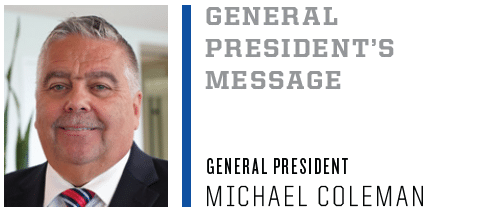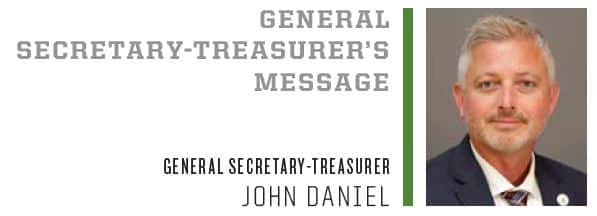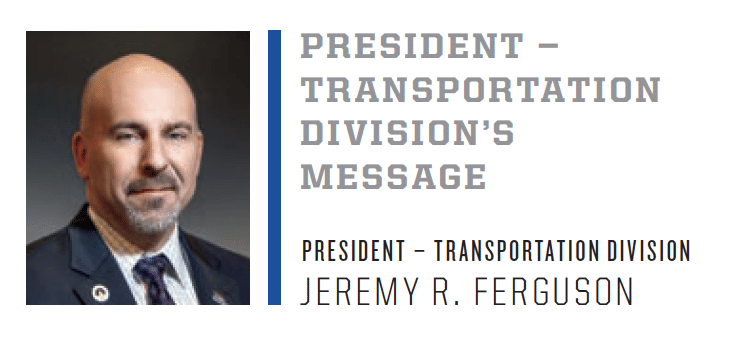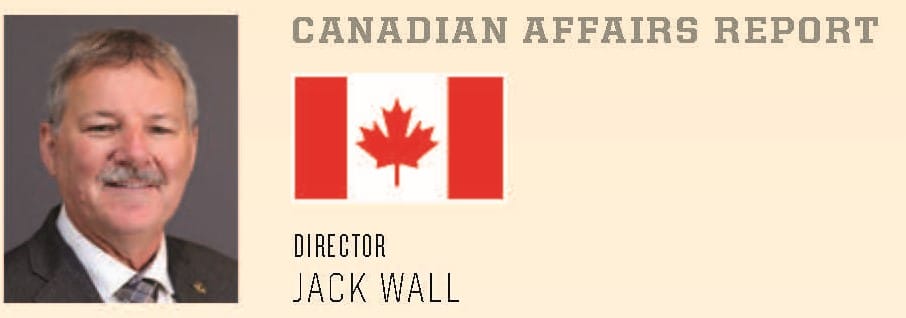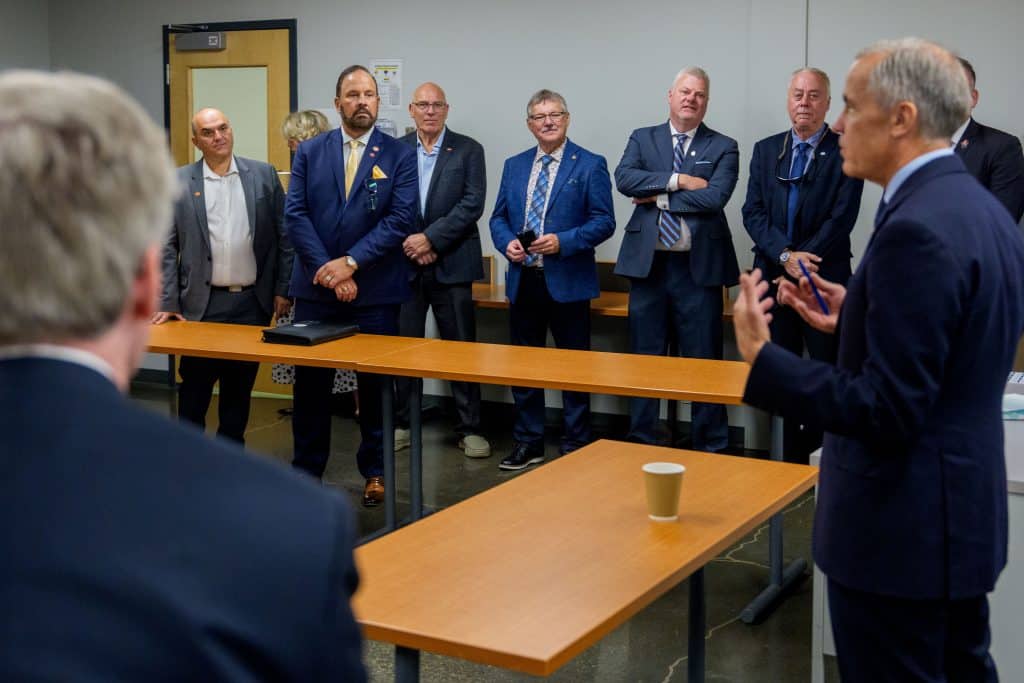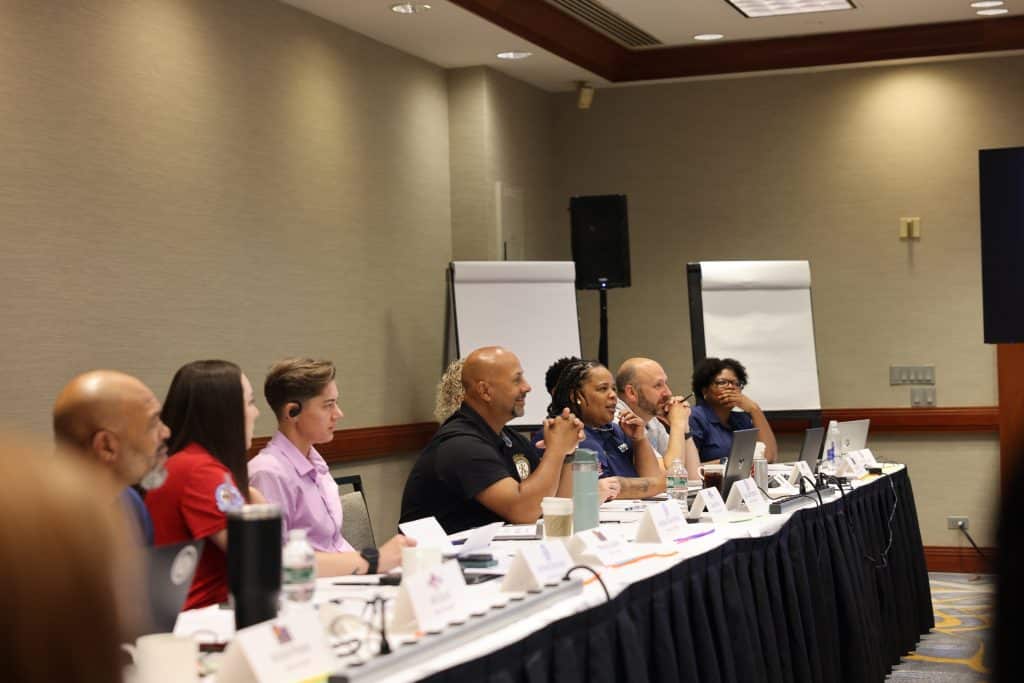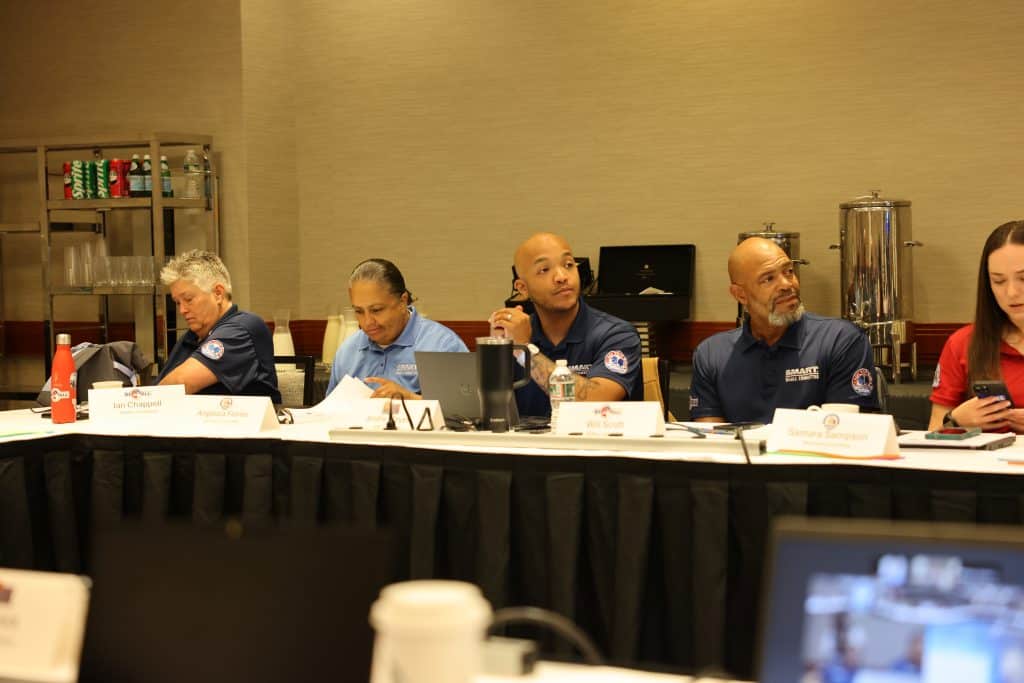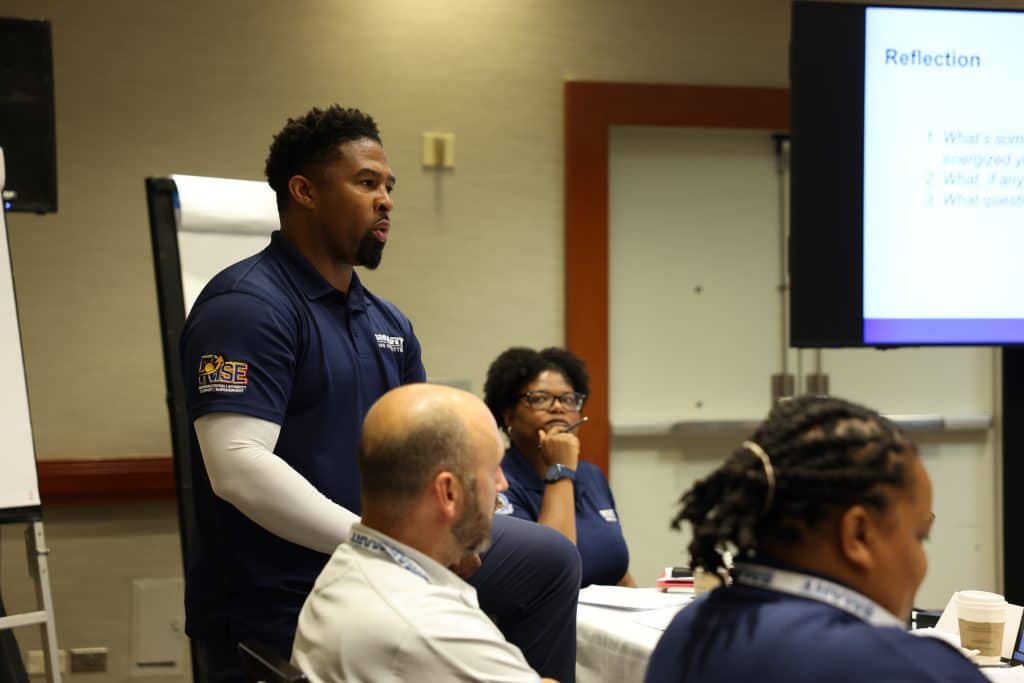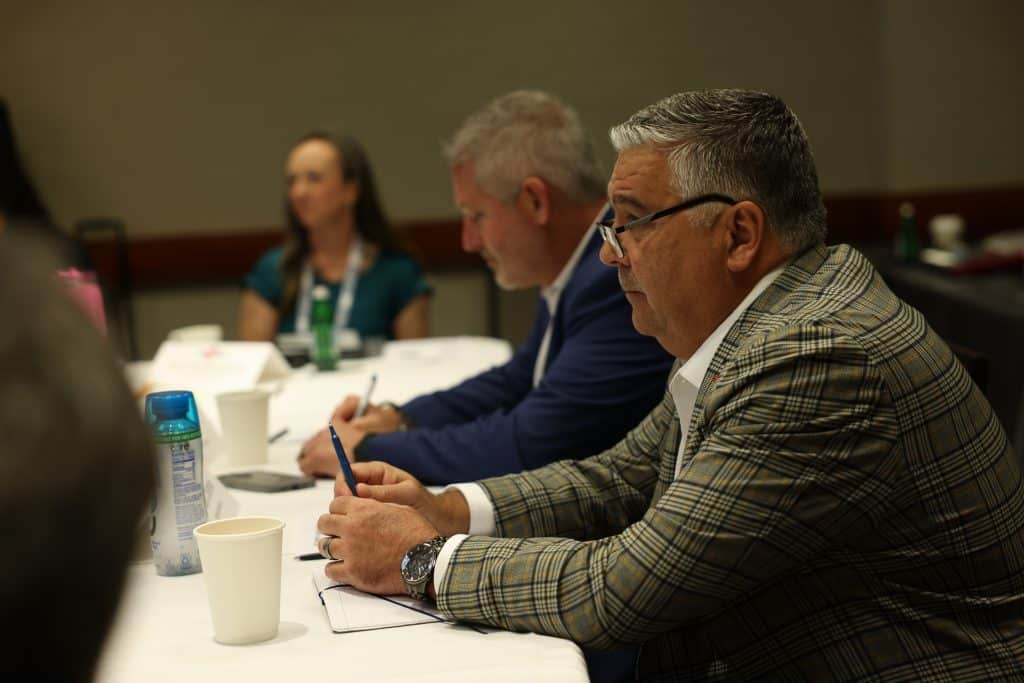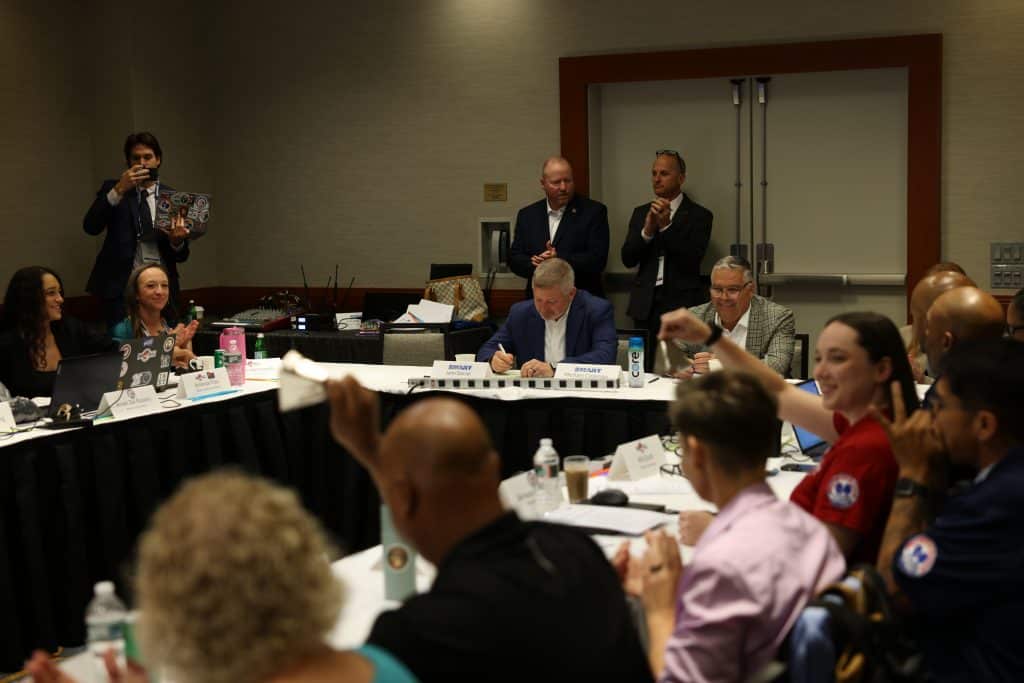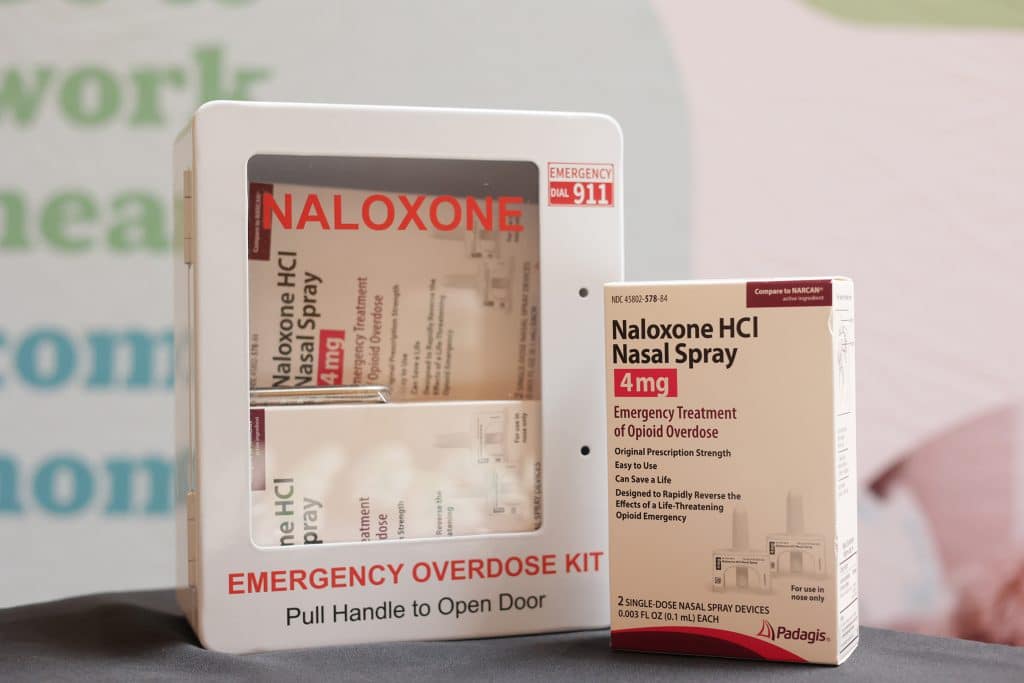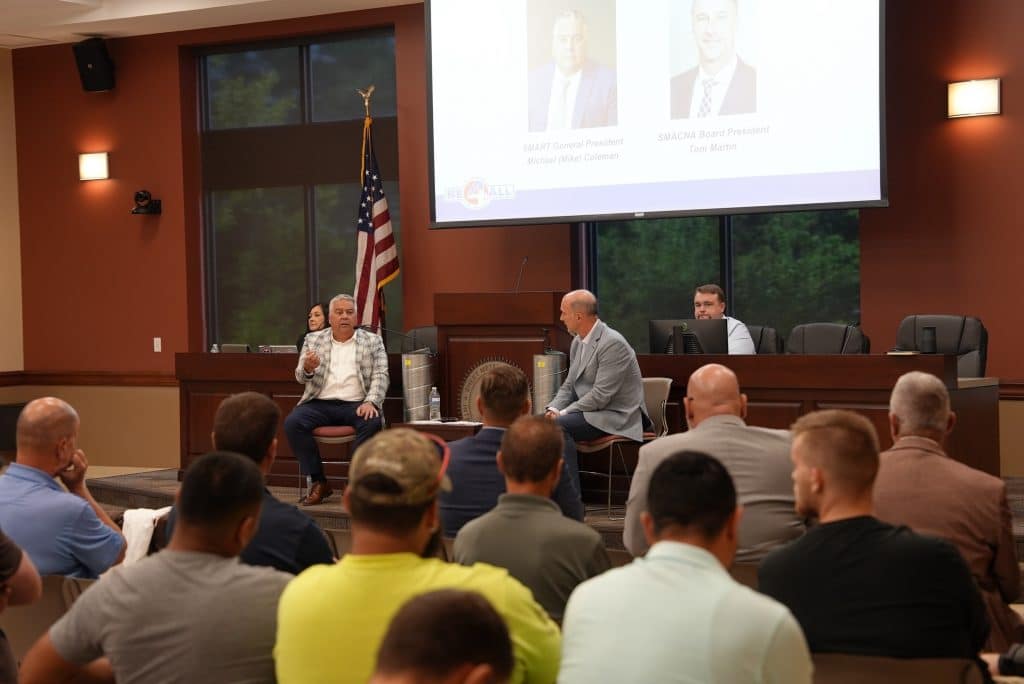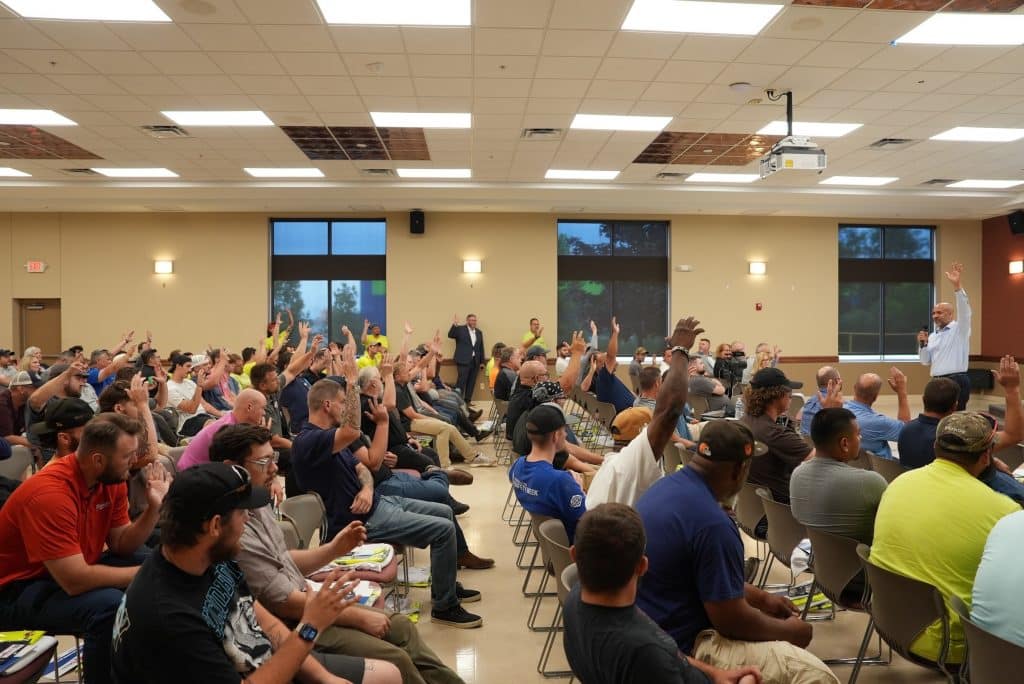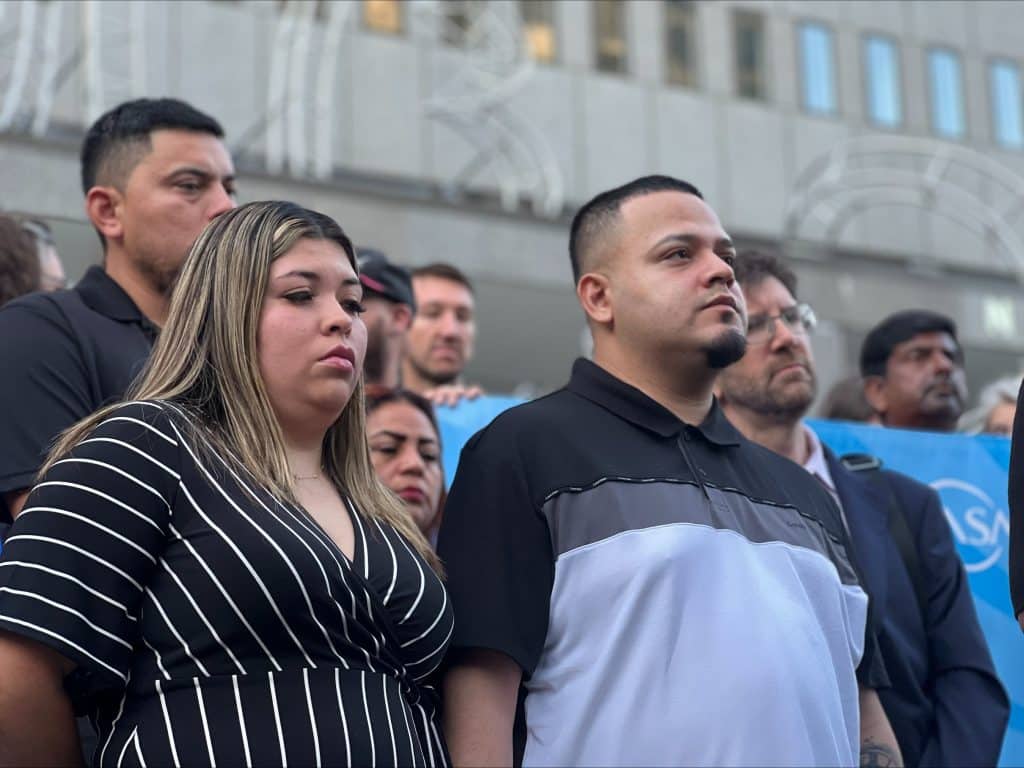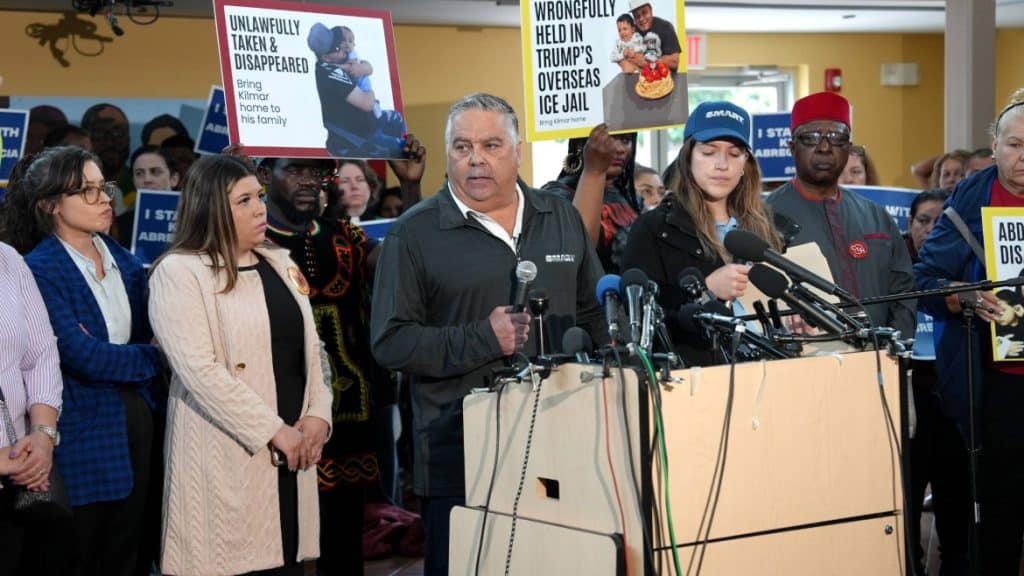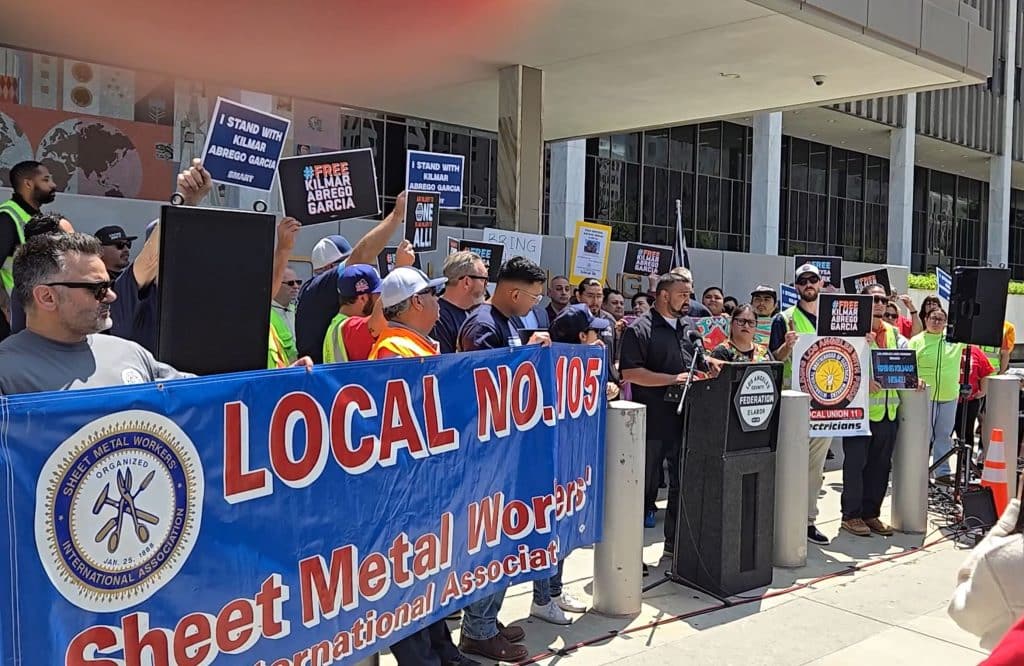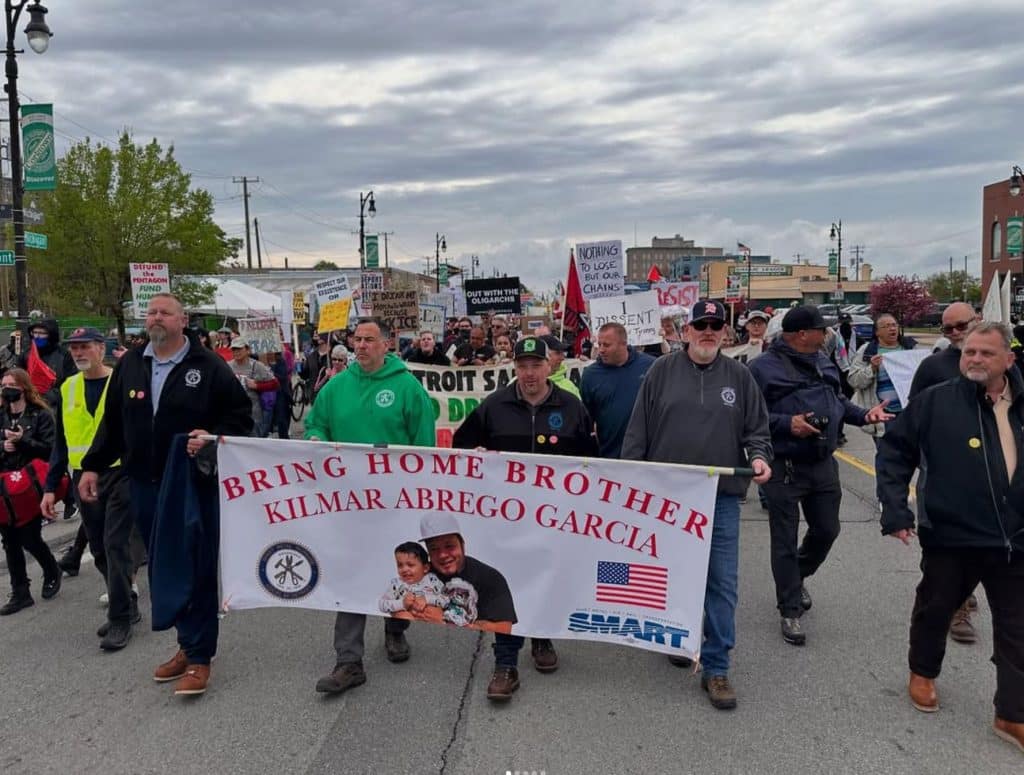“We are all in this fight together. It’s one fight, all fight. So let’s fight for what matters … our members.”
That quote, delivered by SMART General President Michael Coleman, summed up the 2025 SMART Leadership Conference. Kicking off Monday, August 4, the conference brought local union officers from every craft, trade and industry — across sheet metal, transportation, the United States and Canada — to New York City, New York, with one common purpose. That purpose? The 2025 conference theme: “Fighting for What Matters…Our Members.”
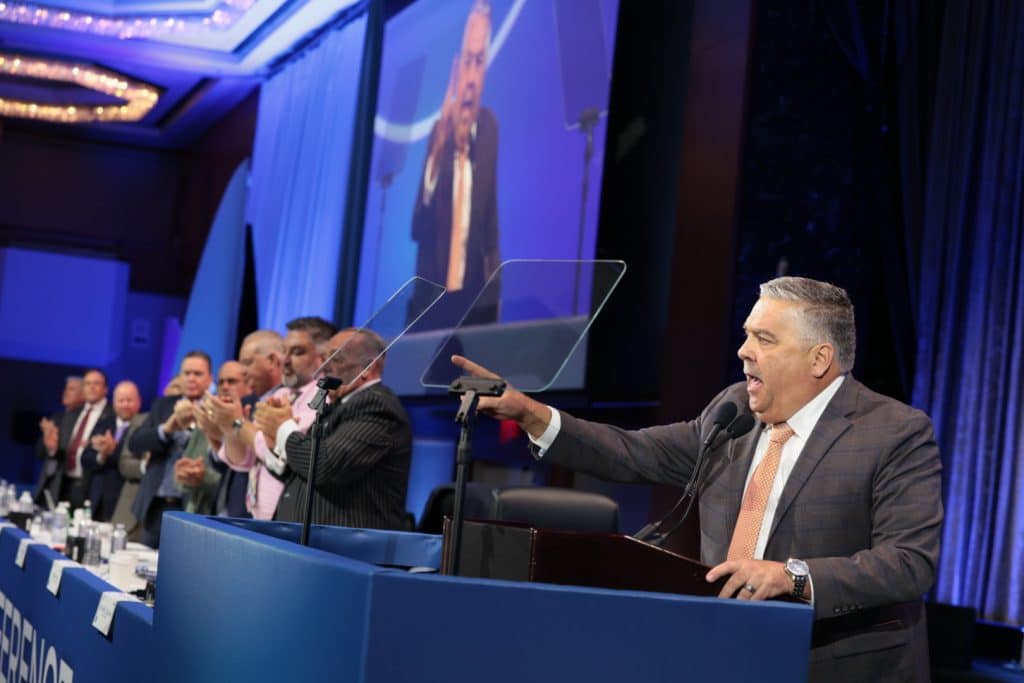
SMART leaders rally attendees in keynote speeches
SMART’s elected leadership addressed conference attendees for the bulk of Monday’s general session, outlining the challenges our union has faced and the importance of sticking together for the fights ahead.
General President Coleman opened his keynote remarks by addressing the circumstances SMART members find ourselves in. To put it simply, SMART and organized labor are facing constant attacks aimed at dividing us.
Our union, Coleman explained, has always fought for the same basic principles: the right to live with dignity, to raise a family, to know your work means something and your future is secure.
But lately, he said, “it feels like those basics are getting lost in all of the noise. It feels like those core principles have slipped to page two of people’s priority list.”
“Brothers and sisters, people are scared,” he added.
Scare tactics are the oldest trick in the book, particularly when anti-worker entities are trying to undermine the cause of unions and organized labor. Whether it’s railroaders fighting against brutal hours and employers treating safety like it’s optional, sheet metal workers and roofers facing rising costs and attacks on our jobs, or shifting tariff policies meant to turn Americans and Canadians against one another, SMART members are up against a lot right now.
That’s why it’s more important than ever that we adhere to the conference theme: fighting for what matters, our members.
“Our solidarity doesn’t have divisions, and it doesn’t have borders,” Coleman declared. “But the fights are going to continue.”
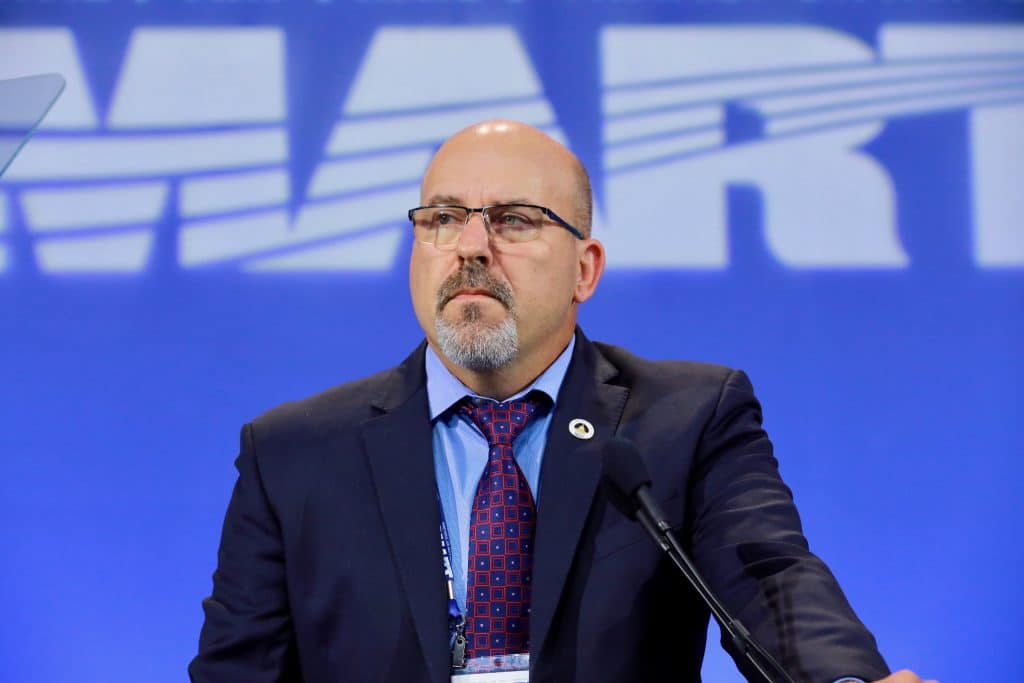
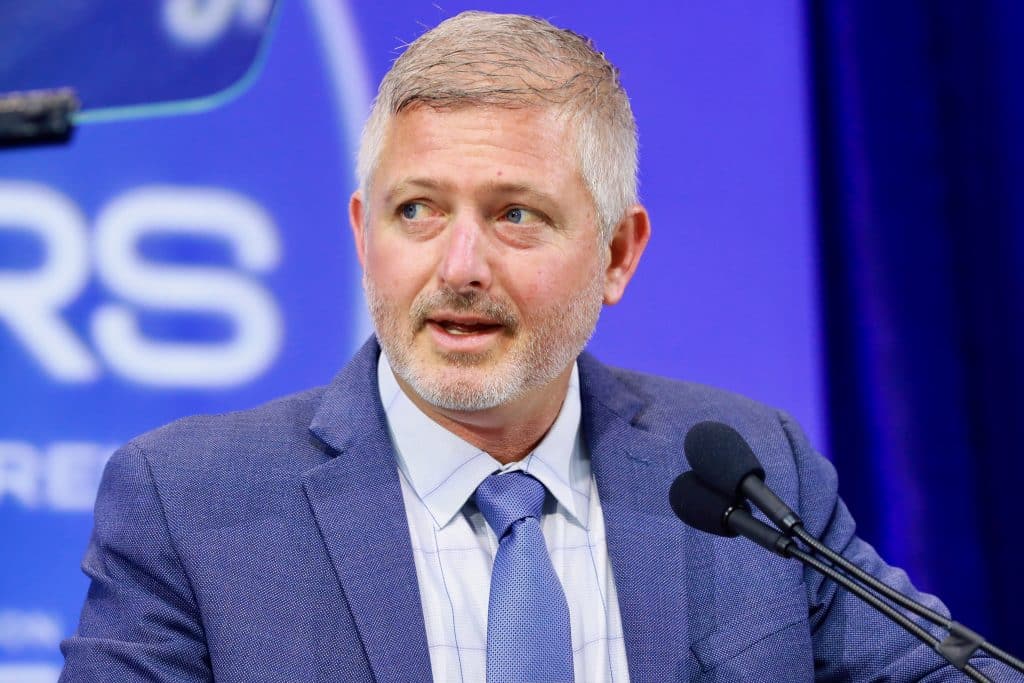
General President Coleman then addressed what he referred to as the issue that “might just be the elephant in the room.” This issue was SMART’s fight for due process that surrounds the case of Kilmar Abrego Garcia.
He leaned into the fact that this union fights for due process for each and every SMART member in the United States and Canada. We fight for due process on the shop floor, we fight for due process in rail yards, and we fight for due process in bus garages. SMART membership does not quit when members clock out.
That’s what defines our union. And those values are vital as we face the powerful forces across North America that hate us. Coleman referenced a recent op-ed written by Steve Forbes that accused SMART-TD of buying our hard-won two-person crew rule.
“See, people like Steve Forbes can’t imagine a world where working people have any power. They just can’t fathom that,” he said.
General President Coleman wrapped up his opening remarks by addressing the uncertainty we face in the world today. He talked about the mergers being proposed on the rail system. He talked about the near daily headlines about megaprojects being canceled; projects that looked set to create years of good-paying jobs for sheet metal workers.
But, he pointed out: That is why our union’s annual leadership conferences are so important. Officers come to these conferences to train and prepare to put up the best fight possible, because that is what SMART’s membership expects and deserves.
“…let me tell you what gives me hope,” Coleman said. “This right here. This gathering of labor leaders. The solidarity we developed over the years. The solidarity that we saw last year at the convention.”
“That,” he concluded, “is what this moment demands.”
General Secretary-Treasurer John Daniel used his remarks to speak directly to the officers in the room.
“We are in a fight that matters,” he told attendees.
He pointed out that officers’ leadership must revolve around listening and responding to members’ needs.
And in 2025, “All that matters is this: Can I take care of my family?” he said. “That is where the politics get real.”
That’s why, at the International level, SMART is working tirelessly to take advantage of new tools and data to strengthen our union’s resilience and bolster efforts to recruit, retain and grow. And it’s why, Daniel reemphasized, every leader — from the newest elected officer to the seasoned rep — needs to refuse comfort and instead continuously listen and lead.
“Let’s fight for what matters,” he said. “Not just for our jobs. Let’s fight for our families. Let’s fight for our futures; our ability to look the next apprentice in the eye and say, we’ve got your back.”
“I am here to fight with you,” he concluded. “We are here to fight together.”
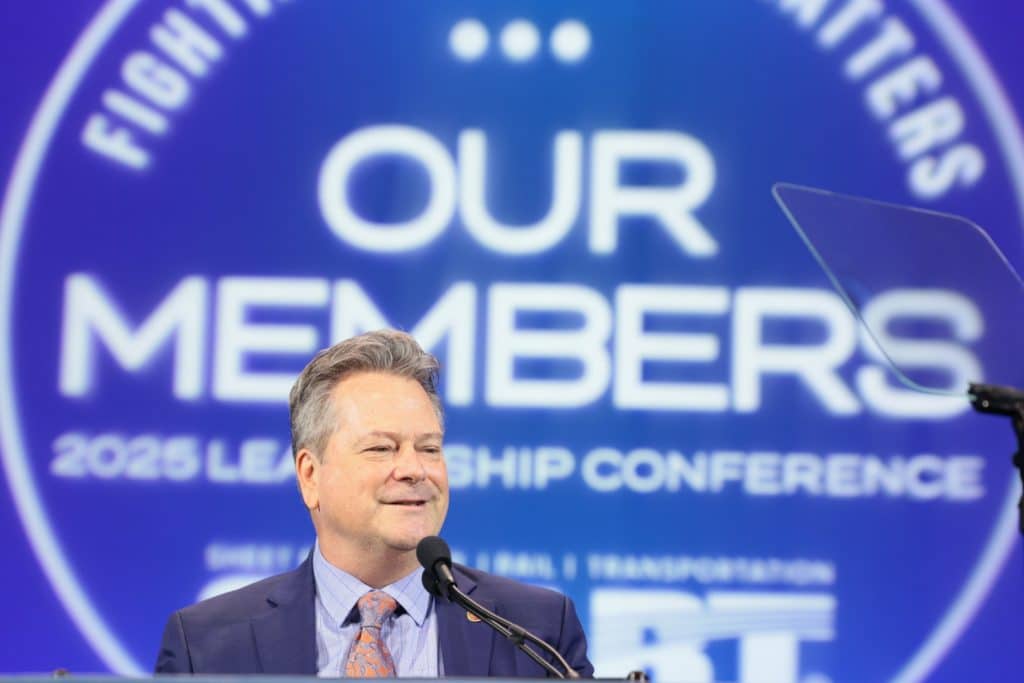
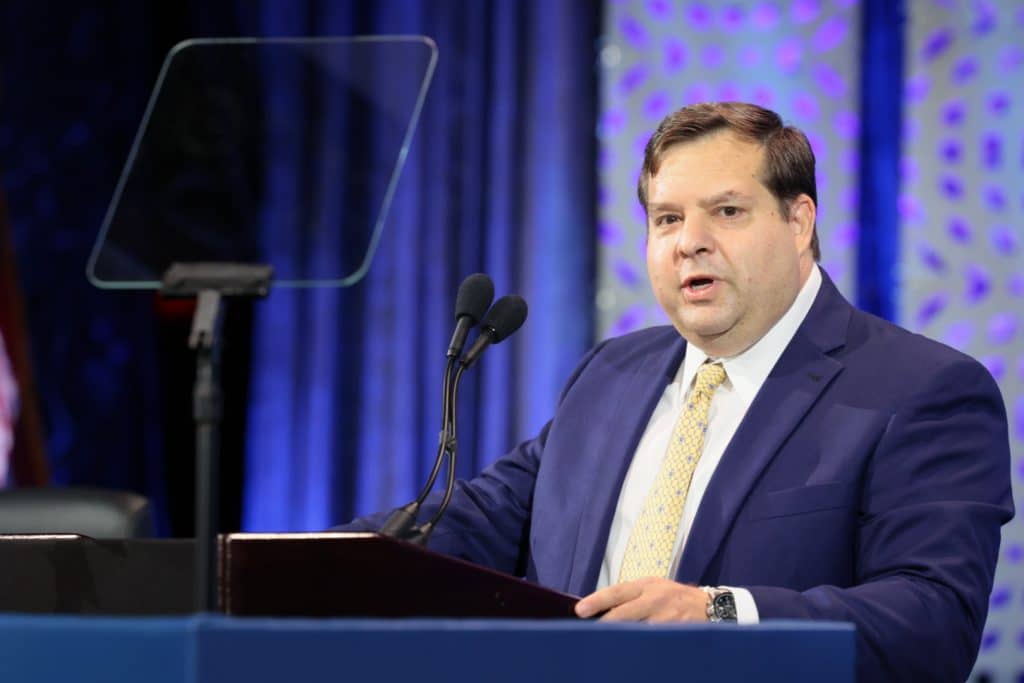
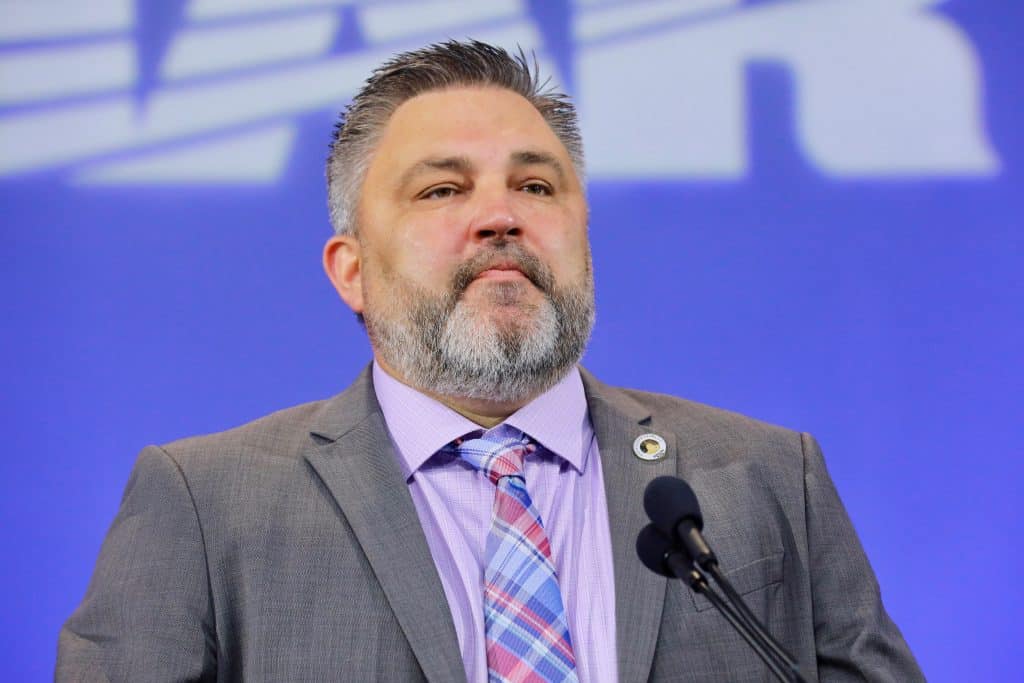
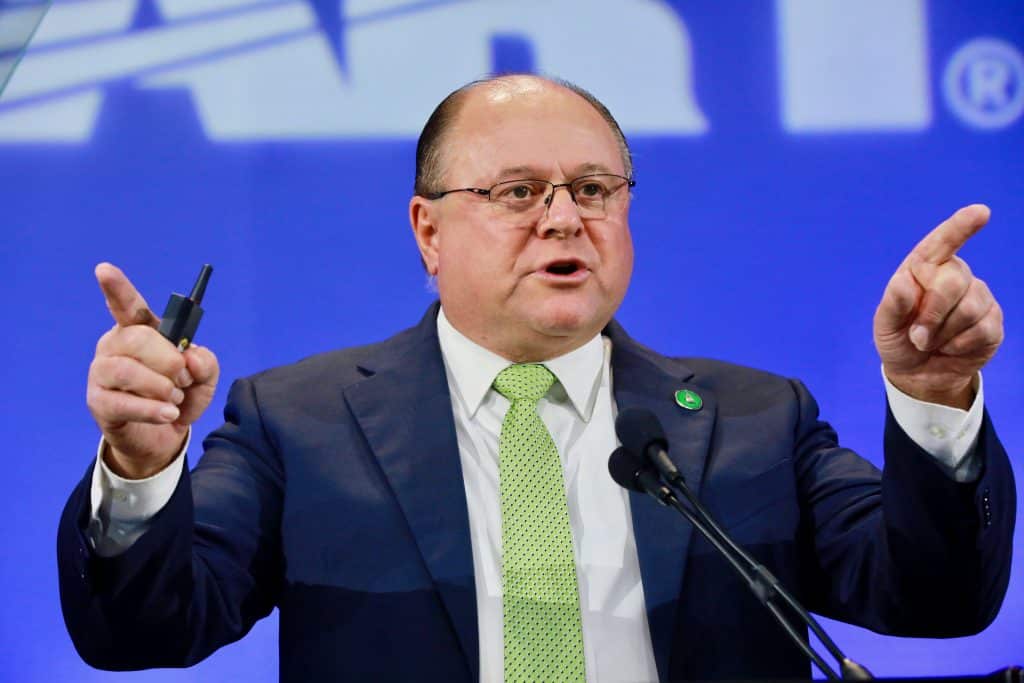
Transportation Division President Jeremy Ferguson used his remarks to urge SMART-TD leaders to match the courage and commitment members display every day. He pointed out that in moments of danger, on the job and in their communities, SMART members are known for their decisive and selfless leadership, and that officers owe it to them to lead from the front, reflecting that same warrior spirit back to them.
He pointed out the importance of this mentality, especially in the face of attacks on our two-person crew rule and the ongoing threat of automation.
“Our leadership must mirror the fight our members display — and stand just as strong.”
He urged every officer in attendance to take the information they received during the conference to heart and to use it to better defend members back home.
Attendees also heard from leaders from the conference’s host local unions: General Chairperson, SMART-TD General Committee of Adjustment 505 Anthony Simon; Local 28 (New York City and Long Island) Business Manager Eric Meslin; and Local 137 (New York City) Business Manager Anthony Fotiadis.
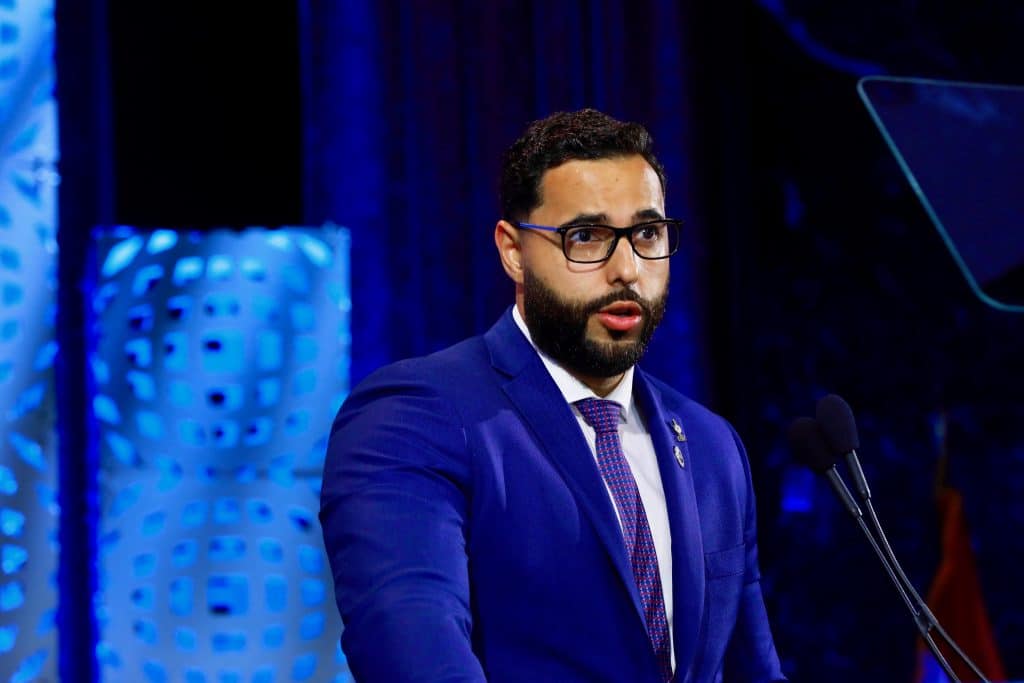
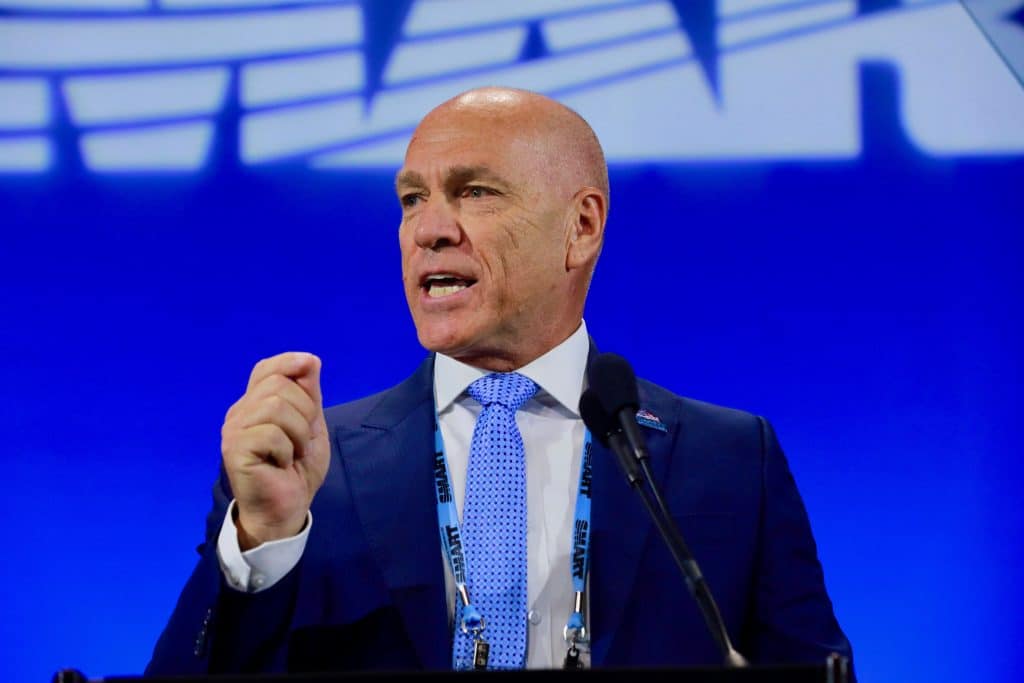
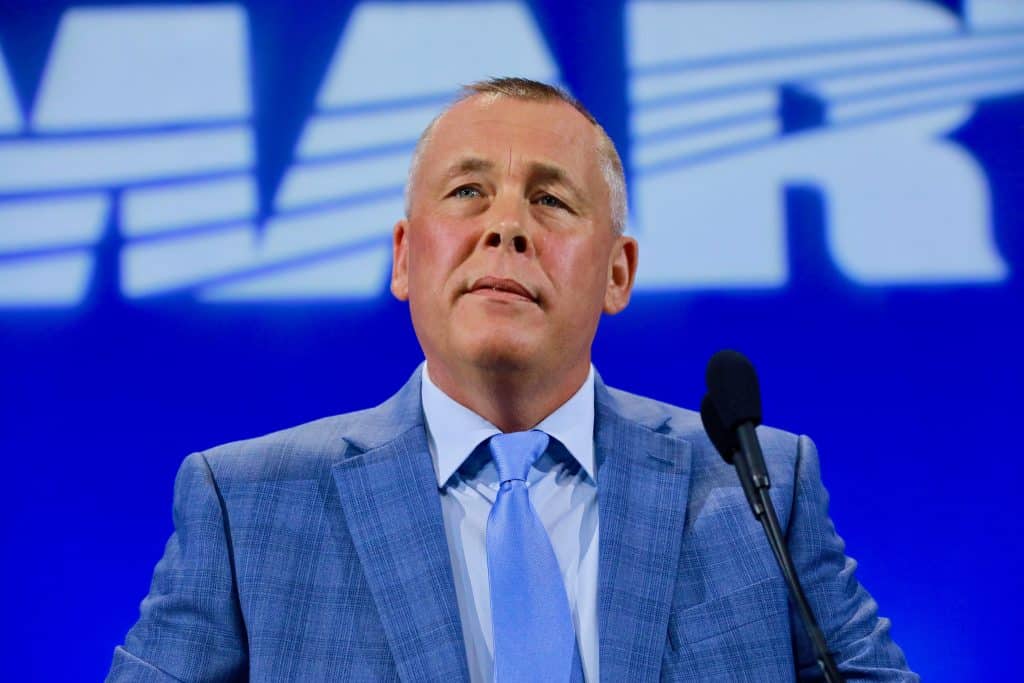

General sessions welcome congressional allies
Union sheet metal and transportation workers are greatly impacted by the actions of the federal government — both positively, like the Federal Railroad Administration’s two-person crew rule, and negatively, like the recent One Big Beautiful Bill Act, which is set to raise health care costs and threaten projects that would have put SMART members on construction jobs.
That’s why SMART works tirelessly to develop strong alliances with pro-worker legislators across the political spectrum. During the 2025 Leadership Conference, SMART officers heard from Congressman Tom Suozzi, House Democratic Leader Hakeem Jeffries, Congresswoman and New Jersey gubernatorial candidate Mikie Sherrill and Congressman Joe Morelle — political leaders who have stood by SMART members throughout their public service careers.
Congressman Suozzi, who represents Long Island and parts of Queens, addressed the conference on Monday morning. Suozzi has defined his time in Congress by pushing for prevailing wages, strong apprenticeship programs, union jobs and two-person crews, and he proactively stands alongside SMART-TD members at the Long Island Rail Road, advocating for their priorities in Congress.
Suozzi told attendees that he will remain an ally, promising to fight for the elimination of taxes on overtime, support pro-worker legislation like two-person crews and promote collaboration between parties to improve SMART members’ lives.
“We need to return back to rewarding hard work,” he said. “When you play by the rules, you should earn a decent life.”
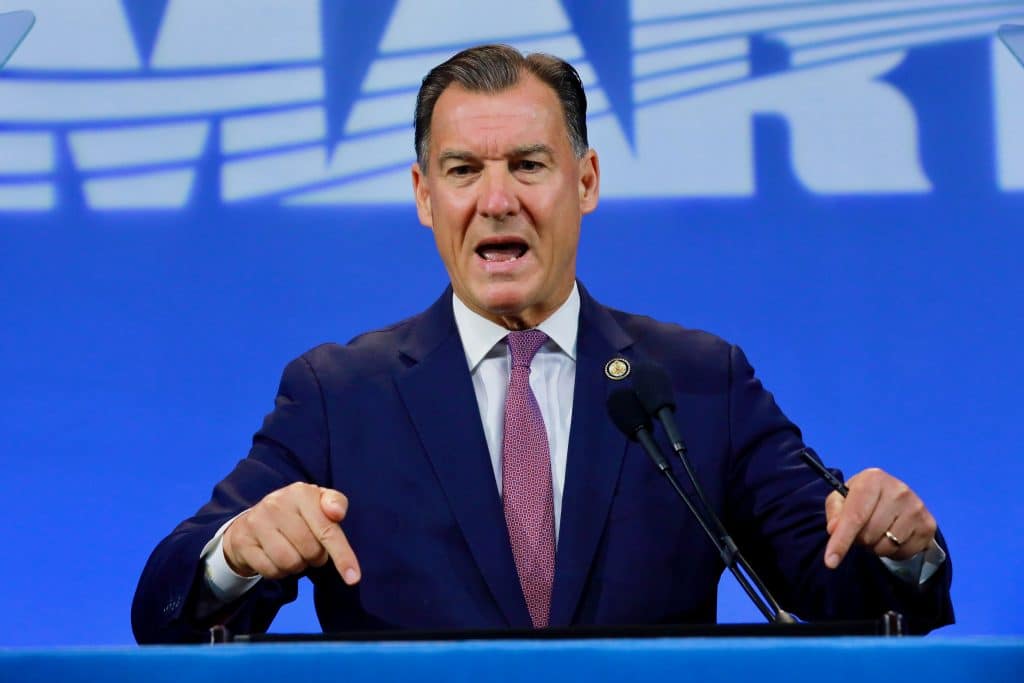
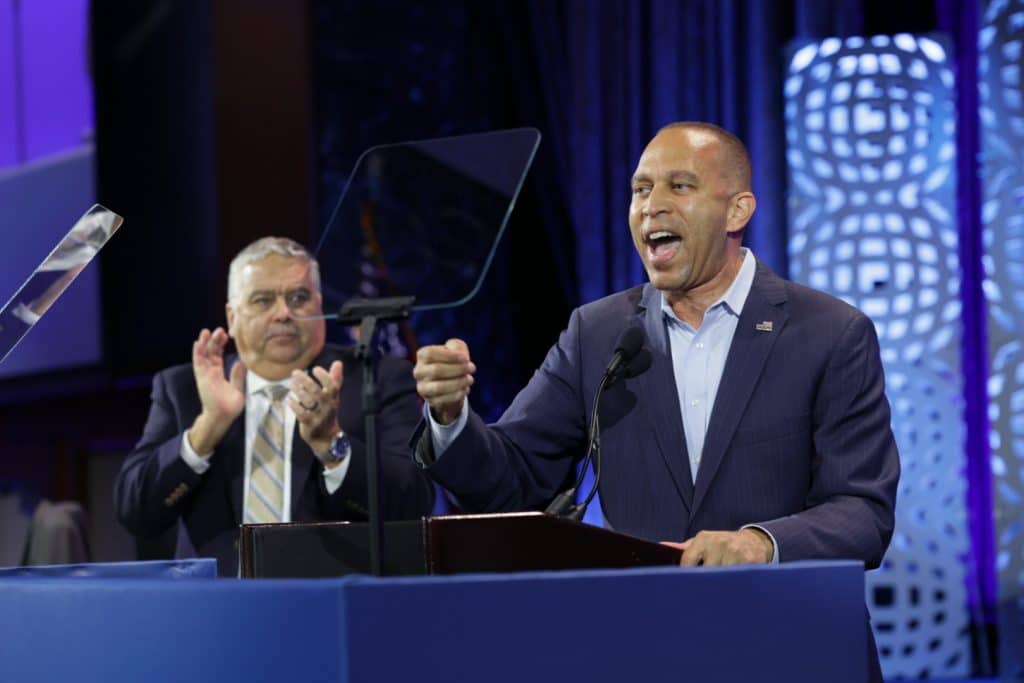
Rep. Jeffries, who has worked to support and pass laws that benefit sheet metal and transportation workers for years, fired up officers with a speech about our core American values and the fight ahead:
“What an honor and privilege to be with this great union during this critical time — a union that continues to fight for hardworking American taxpayers, for your members, for people who are working hard to pursue the American dream.”
“When you put workers first,” he added, “when you put unions first, you put America first.”
Costs are too high right now, Jeffries said, and the actions of Congress and the current presidential administration aren’t doing anything to stop that, particularly with the passage of the 2025 spending bill. That bill, he noted, is an attack on health care, on organized labor, on good-paying jobs. He promised that in response, he and fellow pro-union representatives would put their focus on making the lives of working families and union members better: “We don’t need to be in a country of the billionaires, by the billionaires and for the billionaires. We should be a country of organized labor, by organized labor, for organized labor.”
The fight ahead, Jeffries said, is not going to be easy. The road will be challenging. But unions and worker allies aren’t going to back down. He vowed to work hard to elect a pro-union Congress that will fight on behalf of SMART members, the right to organize, prevailing wages and beyond.
“Together, we will succeed,” Jeffries declared.
During her time in Congress, Rep. Sherrill has done more than just talk about being a pro-worker candidate. With her votes to pass job-creating laws for sheet metal workers and her advocacy for railroad safety and union jobs in the transportation industry, she has walked the walk. Sherrill took time off the campaign trail for New Jersey governor to speak to officers about her dedication to ensuring organized labor and SMART members are prioritized, whether in Congress or, if elected, as Jersey governor.
“We’re facing big challenges in the Garden State,” she said.
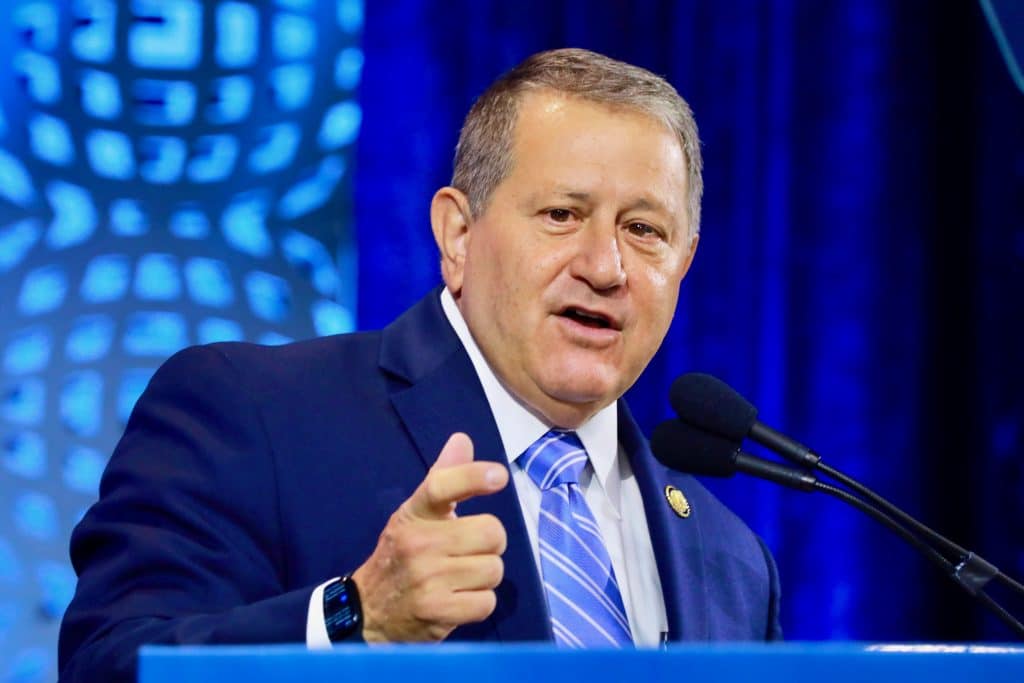
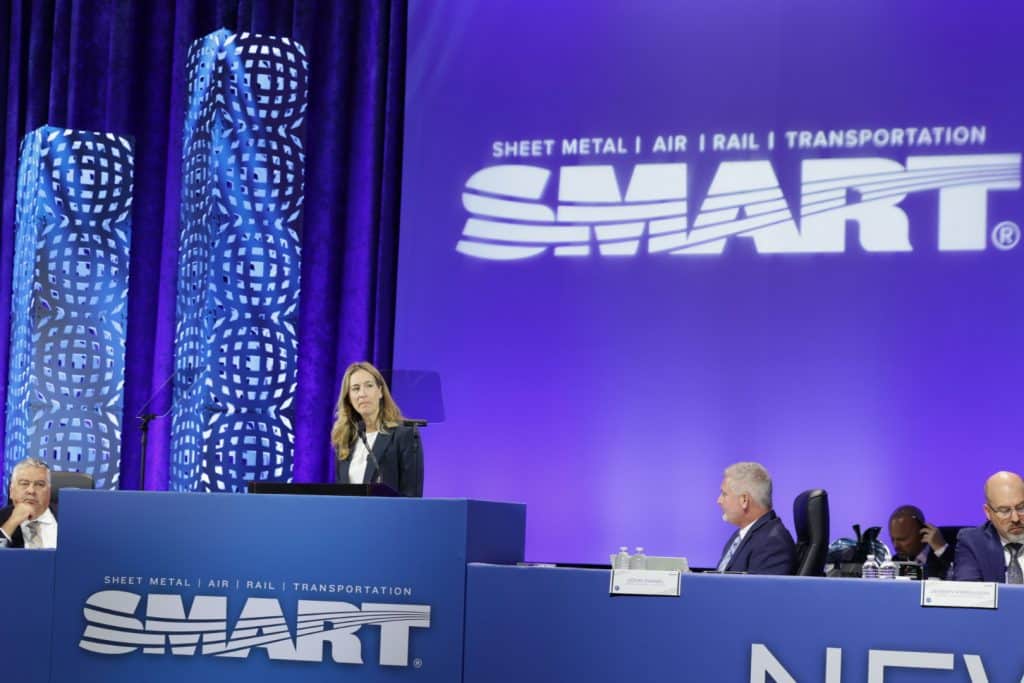
Discussing her campaign to build housing and infrastructure in New Jersey — with strong labor standards to put SMART members to work — and to lower costs for working families across the state, Sherrill described the importance of investing in public transit and transportation, ensuring that railroad crews and transit operators are safe and protected. (Sherrill has worked closely with New Jersey Safety and Legislative Director Ron Sabol in the past.) She also detailed her plans to expand apprenticeship programs and invest in child care and mental health programs for members and families.
“While some paint this election as a Democrat versus Republican narrative, that’s not what this is about,” Sherrill concluded. “This election is about making our state the best possible state for working families.”
Rep. Morelle has represented Rochester, New York, in Congress since 2018, standing up for Local 46 sheet metal workers and all SMART members nationwide. His voting record reflects his actions on behalf of SMART workers and families — voting for job-creating laws like the Bipartisan Infrastructure Law, the CHIPS Act, the Rail Workers Sick Leave Act and more. During his remarks to conference attendees, he thanked International and local leaders and SMART members everywhere for the work they do every day to better our country. He also outlined the ways he and fellow pro-worker legislators are fighting alongside SMART on behalf of members — not with words, but with actions.
Informed by his father’s life as a union plumber, Morelle discussed the importance of doing the work, whether on the jobsite, in the rail yard or in the halls of government.
“That’s what American exceptionalism is — it’s not about being richer, about being more sophisticated, it’s about outworking everybody … and that’s what SMART members do,” he said.
Morelle also talked about how the recently passed spending bill takes money from the poorest people in America in order to benefit the richest. As billionaires get richer and working people suffer, he called for investment in union labor, PLAs on every project in America, the passage of the PRO Act and the National Apprenticeship Act, and more.
“If we want to fix the problems, we need to spend less time talking, more time doing. … Let’s not waste time,” he concluded.
STB chair visits SMART conference in the wake of merger news
The Surface Transportation Board (STB) plays a key role in the careers and lives of SMART-TD railroaders, overseeing the economic regulation of surface transportation — particularly freight rail — and the development of major railroad legislation. For that reason, SMART is committed to working with the STB in any way possible to benefit the lives of members; a commitment demonstrated as officers welcomed STB Chair Patrick Fuchs to the leadership conference on Wednesday, August 6.
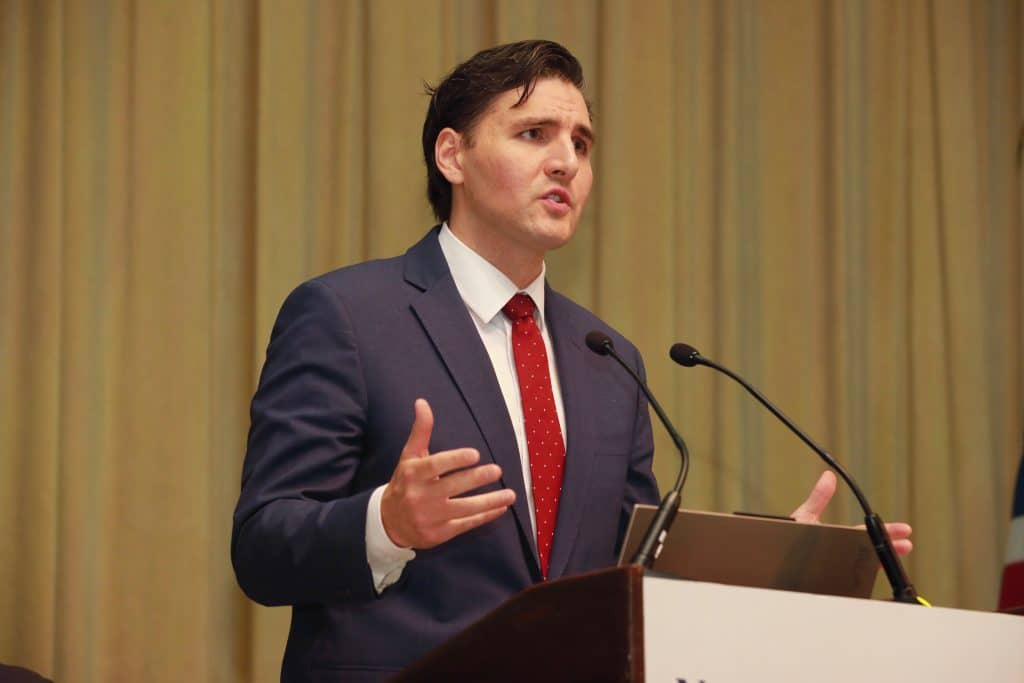
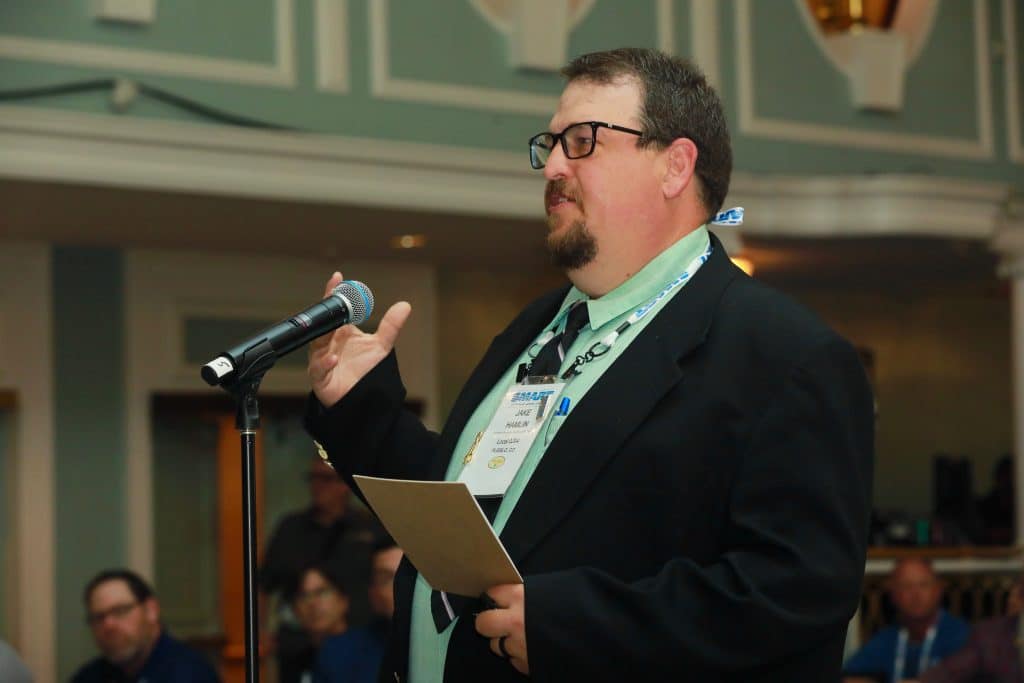
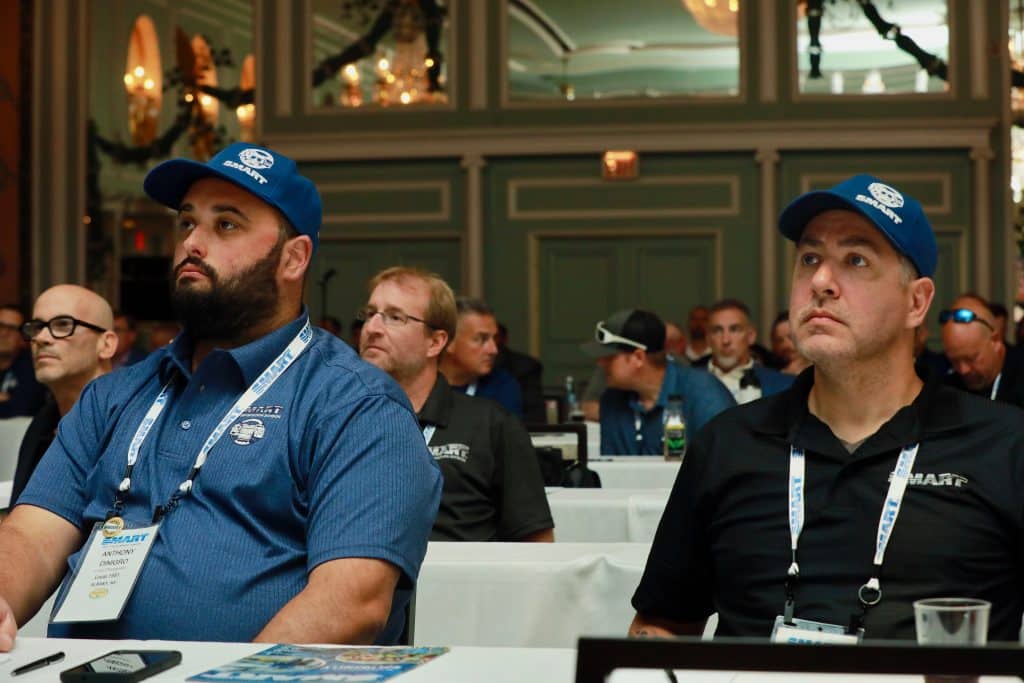
In his remarks, the STB chair provided an overview of his role and the structure of the STB, as well as his goals as chair, namely accountability and transparency to the public and to the various bodies that the board serves.
But the biggest talking point for officers in the room was the proposed Union Pacific-Norfolk Southern merger.
Fuchs was prohibited from talking about his personal views on the merger or answering specific questions; however, he was as open as he could be, and he was crystal clear about one thing: “As long as I’m chairman, labor will always have a seat at the table. … We need your perspective.”
SMART-TD found out about the proposed merger from the news. By contrast, Chairman Fuchs told SMART-TD he wanted labor to be involved. He proved that, to an extent, later in the morning: Following his speech, Fuchs participated in a Q and A session with SMART-TD legislative representatives and general chairs to find out what our issues are at the ballast level.
“What I can promise you is that the board will give [the proposed merger] a fair and thorough review,” he told officers.
Fuchs went out of his way to say that he and the STB are seeking SMART’s input, and input directly from members, to be included in the decision-making process.
Officers demonstrate solidarity, honor member engagement
An annual highlight of every SMART Leadership Conference is the Joseph J. Nigro SMART Army Member of the Year award, bestowed upon transportation and sheet metal members who go above and beyond in representing the values of our union.
The SMART-TD winner, Local 200 member Amanda Snide, serves as a local chairperson, local safety and legislative representative and as the Nebraska assistant safety and legislative director — all while working as a switchman and yard foreman in North Platte, one of the largest and busiest rail yards in North America. While introducing Snide, General President Coleman discussed several stories of her recent service to fellow members and working families.
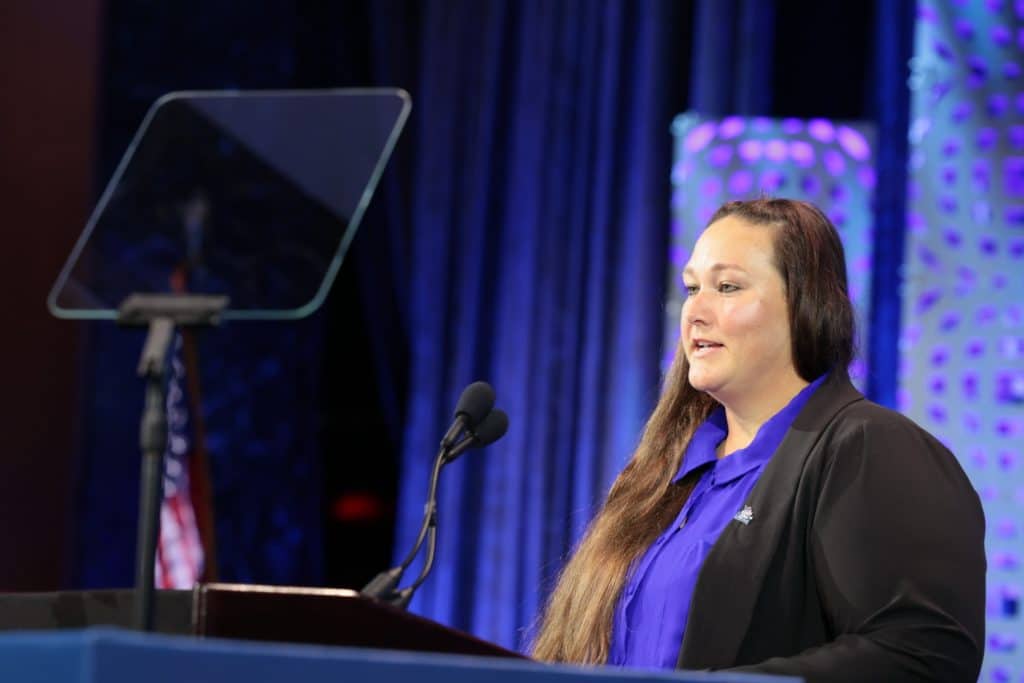

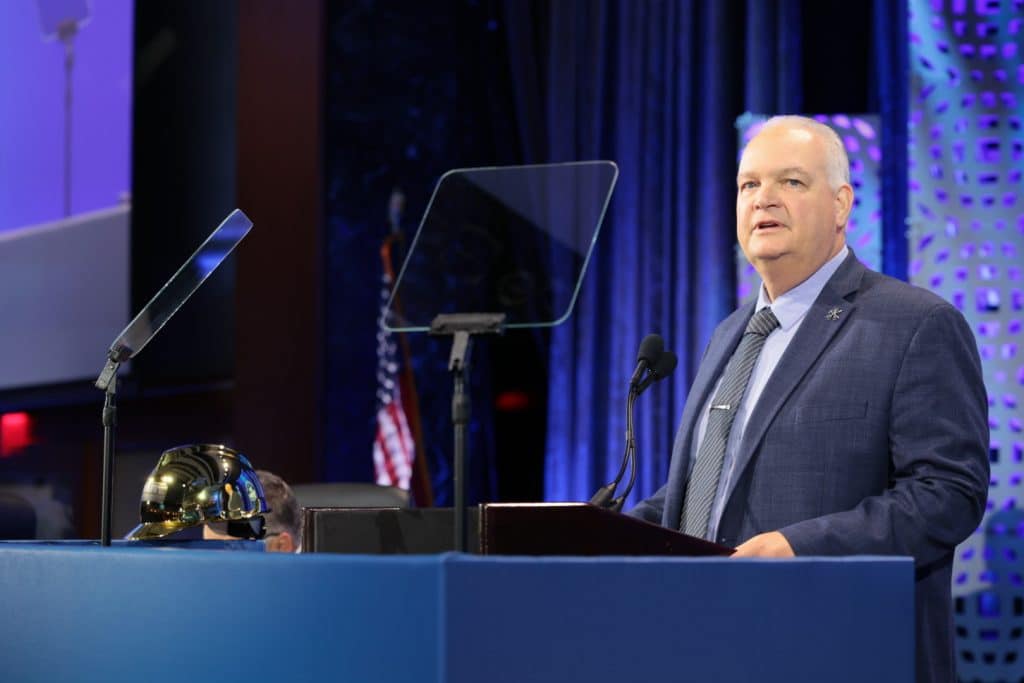
That included the time, just this last summer, when Snide was at the TD Regional Training Seminar in Denver, Colorado, and got the news that one of her fellow members in North Platte was in an accident and in danger of losing his arm. Without hesitation, she left the RTS and headed home to ensure her union brother’s rights were protected, that he received the best possible treatment and that his family was taken care of.
“That shows exactly what kind of leader Amanda is,” Coleman said. “She truly represents this year’s conference theme.”
“Our union has both provided for me, and provided ways for us to give back — fighting for what really matters, our members,” Snide said, reflecting on her journey. “We refer to one another as family because we rely on mutual support … our collective strength is founded on knowing our brothers and sisters stand ready at our side.”
The 2025 sheet metal Joseph J. Nigro SMART Army Member of the Year couldn’t be in New York City to accept her award. But Local 104 (Northern California) apprentice Rebecca Suen received plaudits from leadership conference attendees all the same. Suen, who spent nine years serving her country in the United States Army, originally worked in an office job. But after a while, she just couldn’t take it anymore, and thanks to Local 104’s Veteran Direct Entry Program, she started her sheet metal career in 2022.
Since then, General President Coleman said from the podium, Suen has set an example of what it means to be a SMART member. She is a constant presence at Local 104 volunteer events, and she has spoken in favor of project labor agreements and other pro-worker policies at local city council meetings — offering first-hand testimony that has helped win major victories for both herself and her fellow members.
Local 104 Business Manager Rick Werner accepted Suen’s award on her behalf, telling attendees: “She is what we all look at as one of our true leaders in the industry. … I can tell you, Rebecca’s in every union meeting, she’s there every time we need her to help out — she steps up.”
Maybe the most inspirational moment of the day came when General President Coleman welcomed host local leaders and HEART 9/11 President Bill Keegan to the stage, where Coleman announced to officers that, collectively, attendees of the 2025 SMART Leadership Conference raised more than $317,000 for the organization, which helps communities all over recover from disasters.
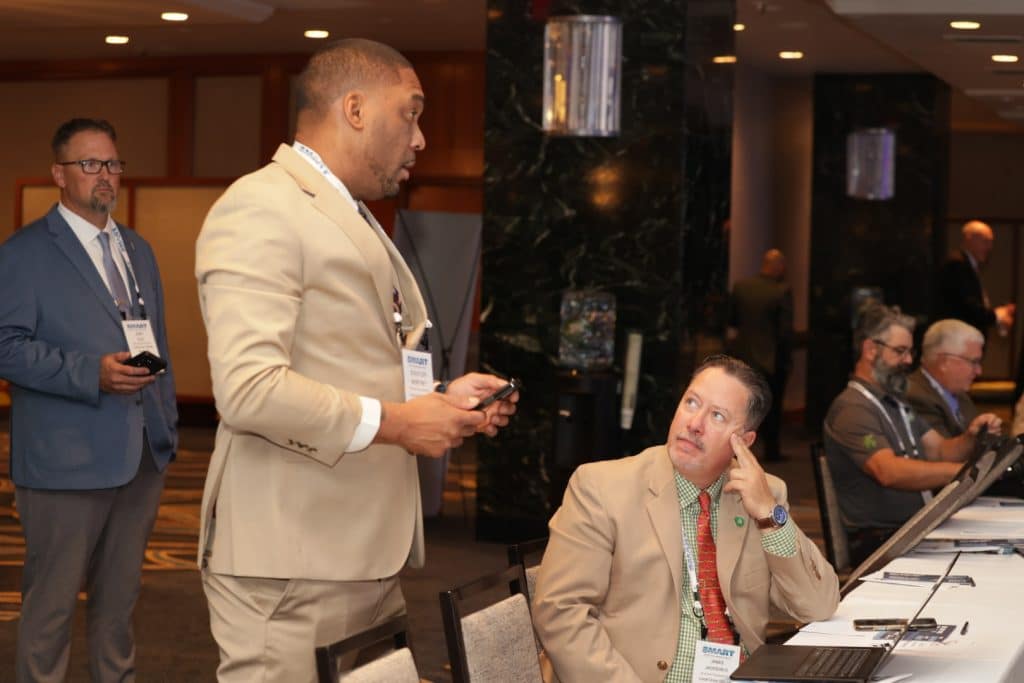
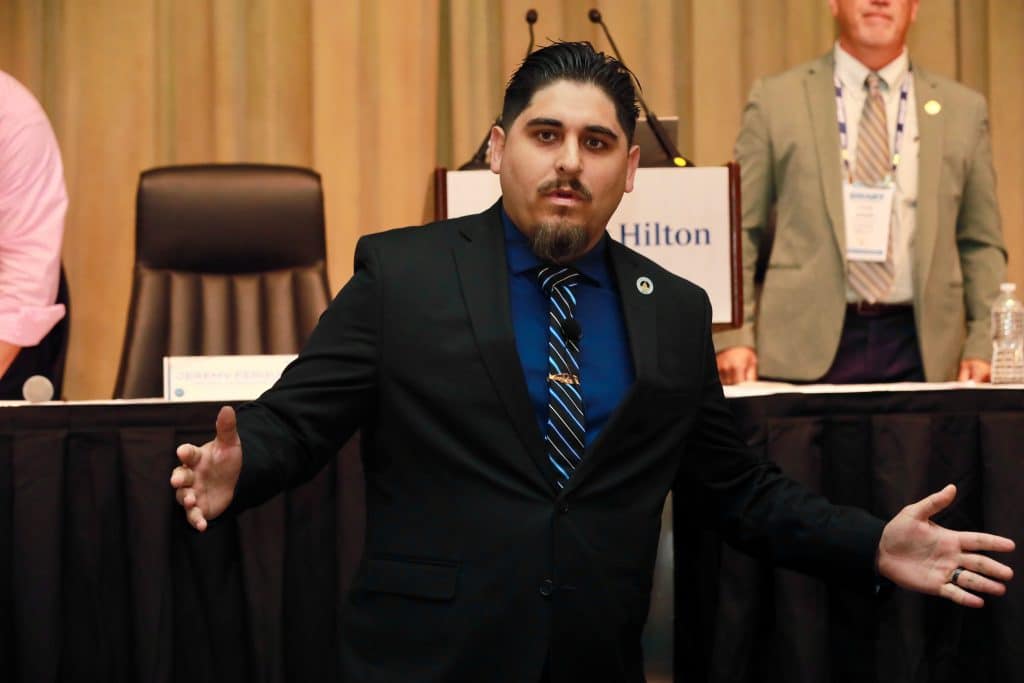
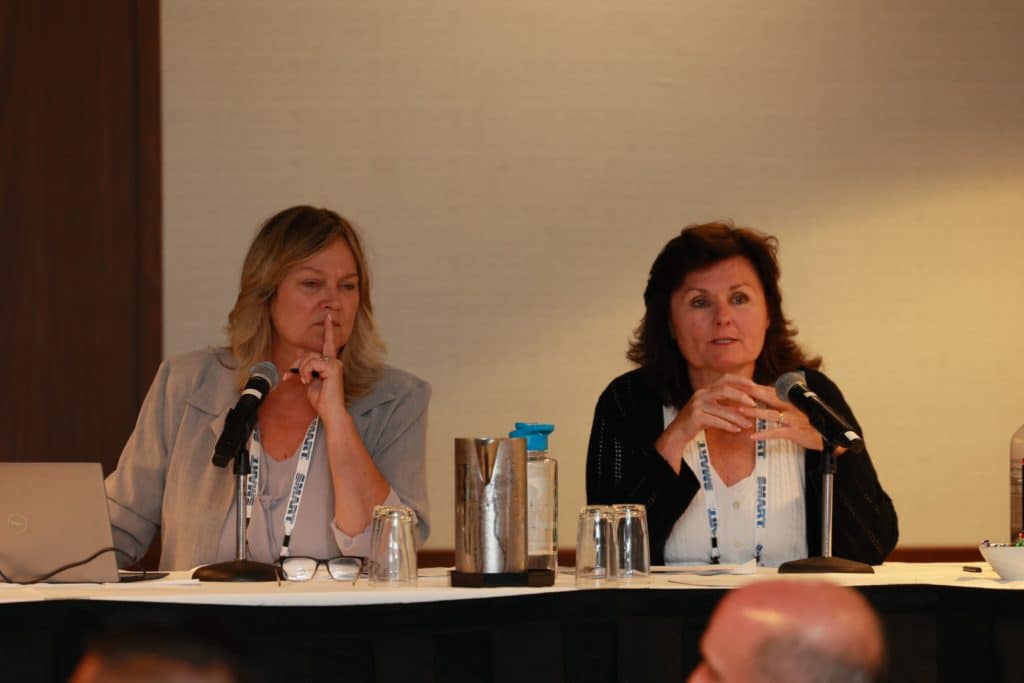
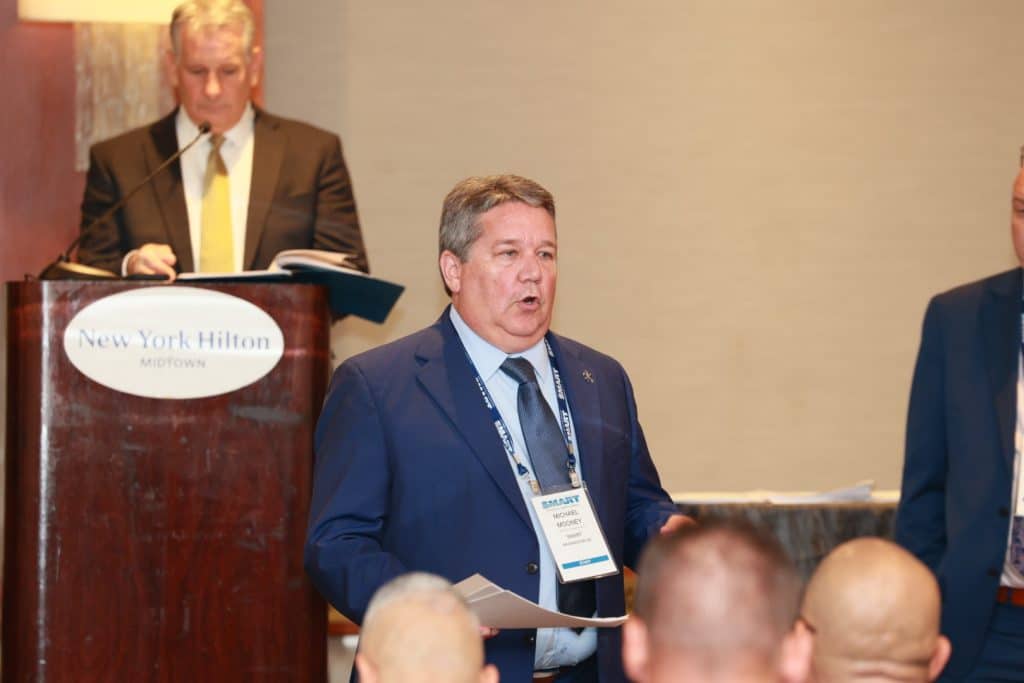
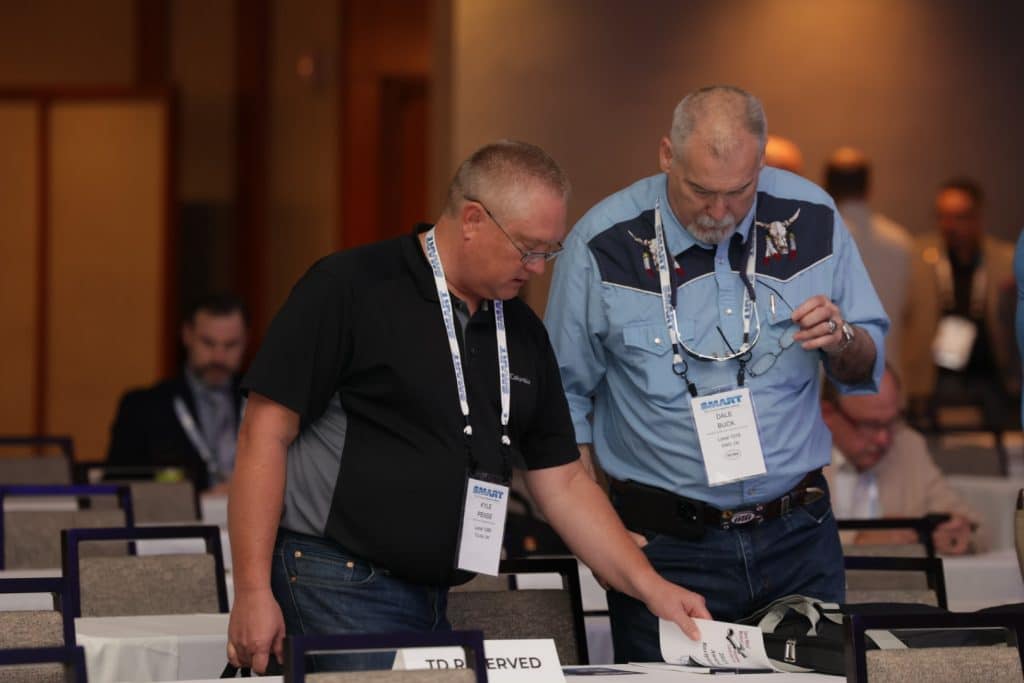
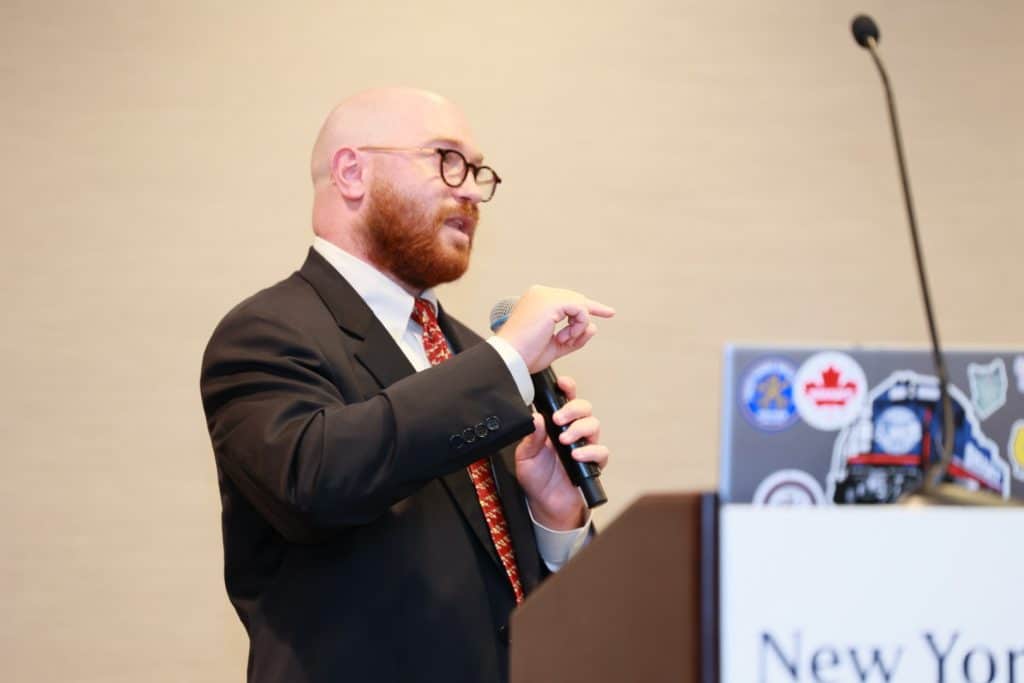
Leaders learned in tailored breakout sessions throughout the conference.
The fight worth fighting
At the end of the final joint session on Wednesday, General President Coleman took the podium for closing comments. Meditating on a successful week of hard work, solidarity and skill building, Coleman noted: “I think about the fight, and what we fight for, every single day. How all we do is lift people up, every single day. And then I think, there’s people out there who hate us.”
There are powerful anti-worker forces across both our nations that don’t just hate our movement, Coleman explained; they want to destroy us.
“We ask that we’re able to take care of our families and our loved ones, and they want to destroy us,” he said, in disbelief.
That’s why these conferences are so crucial, he added. Because we need everyone together as we work to protect and secure the future for our members.
“I want to thank all of you for being in this fight,” Coleman told officers. “That’s what we’re here for. It’s not easy, I know it — it’s exhausting. But you do it, every single day. And members count on you to do that, every single day. And it is the fight worth fighting.”
